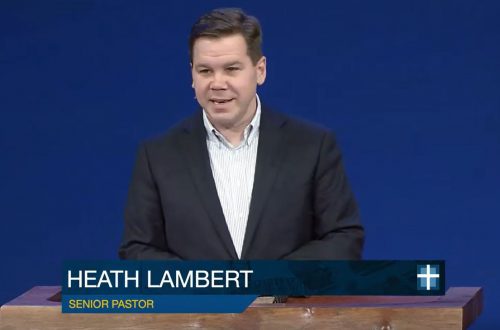 John Piper asks and answers the question, “What are the key issues in thinking through the multi-campus church movement?” You can listen below or read the manuscript here.
John Piper asks and answers the question, “What are the key issues in thinking through the multi-campus church movement?” You can listen below or read the manuscript here.
For Piper, it boils down to this:
“The issues, I think, revolve mainly around what it is to be a church: what constitutes a church, and what constitutes an eldership. . . The essential issue is: How do elders, as one, relate to a people and a unified teaching to the people? I think the preacher is an elder, and the way he relates to the people is as a shepherd. And I think it is implied in the way the New Testament puts things together that there ought to be a connection between that preaching elder and his people geographically. He ought to have access to those people. He ought to be able to go to those people and care for them, visit them in the hospital, whatever, or his band of elders should.”




4 Comments
Nathan
I think there are layers to this question and discussion point. Depending on the denominational background of those who read and participate in this forum, this is either a “what’s the big deal?” or “what are we thinking!”
Now, if you want to speak specifically in context with a denomination, then the discussion might be a little more productive. That is, unless we are going to say that particular denominations (Southern Baptists for example) which have been historically autonomous, can now freely embrace what appears to be a very Episcapol form of government (one set of leaders over multiple churches), without having ramifications on the distinctives of that denomination, we might have a better discussion point.
Unless one comes from an autonomous denominational history or an independent autonomous background the question may seem irrelevant.
As for myself, I have a very difficult time finding those Southern Baptist churches that have mult-campuses maintaining their Baptist heritage.
NOTE: There is a huge difference between multi-campus and a church that it starting a church plant. A church assisting with a church plant will ultimately let go of that new church once it becomes stable and then that new church will be truly autonomous.
Brandon Cox
Thanks for posting this – it’s such a tough issue. We want to be strong, true, and faithful to the exact New Testament model. We want to do what is right, but we also struggle with a little bit of guilt for our unwillingness to become all things to all people. Not an easy issue.
mike
i’m not up to date on all the multi-site churches out there, but the one’s i know of have lead pastors at each site, though the senior pastor at the base church is over all of them.
also, megachurch preaching or senior pastors typically don’t have too much involvement with the laity (though that’s not always the case), so i really don’t see what the difference is.
either way – multi-site church or single-site megachurch – the lead pastor typically does the preaching and is the public figure while staff pastors do the counseling and shepherding. i think any attack on multi-site churches (if that is what piper is doing) that attacks the “shepherding” of the senior pastor should back up and deal with megachurches too.
Nathan
Mike,
Your point is well-taken, but you are referring to another discussion altogether, “How big a congregation is before the Pastor can’t minister intimately with the congregation.” The issue here is whether or not a church should have multiple sites where the budget, vision, leadership, etc. are all controlled by one set of people.
This kind of church has really backed away from congregational rule and depending on the denomination, it is a total about-face to the historic principles of that denomination, the Southern Baptist denomination for example, as my earlier post mentioned.